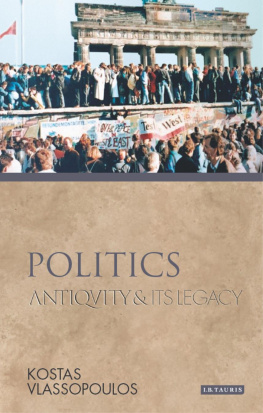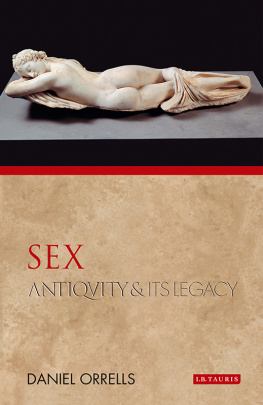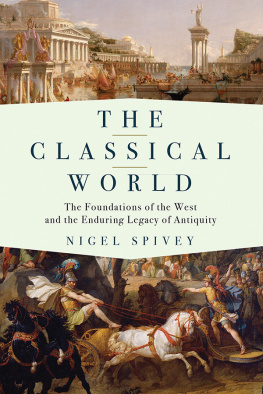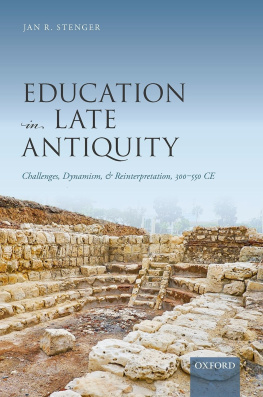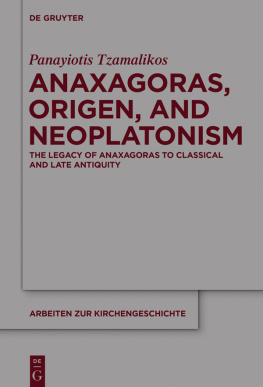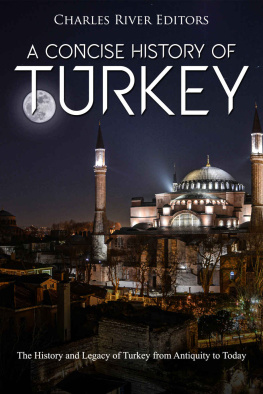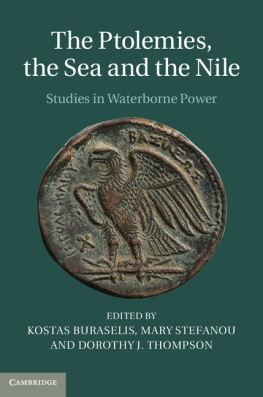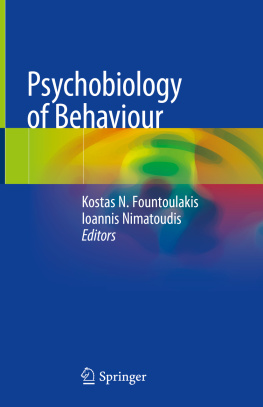ANCIENTS AND MODERNS
General Editor: Phiroze Vasunia, Reader in Classics, University of Reading
How can antiquity illuminate critical issues in the modern world? How does the ancient world help us address contemporary problems and issues? In what ways do modern insights and theories shed new light on the interpretation of ancient texts, monuments, artefacts and cultures? The central aim of this exciting new series is to show how antiquity is relevant to life today. The series also points towards the ways in which the modern and ancient worlds are mutually connected and interrelated. Lively, engaging, and historically informed, Ancients and Moderns examines key ideas and practices in context. It shows how societies and cultures have been shaped by ideas and debates that recur. With a strong appeal to students and teachers in a variety of disciplines, including classics and ancient history, each book is written for nonspecialists in a clear and accessible manner.
KOSTAS VLASSOPOULOS is Lecturer in Greek History at the University of Nottingham. He is the author of Unthinking the Greek Polis: Ancient Greek History Beyond Eurocentrism (2007) and of several articles on politics and society in the world of classical antiquity.
ANCIENTS AND MODERNS SERIES
ISBN: 9781848852006 www.ancientsandmoderns.com
THE ART OF THE BODY: ANTIQUITY AND ITS LEGACY MICHAEL SQUIRE
DEATH: ANTIQUITY AND ITS LEGACY MARIO ERASMO
DRAMA: ANTIQUITY AND ITS LEGACY DAVID ROSENBLOOM
GENDER: ANTIQUITY AND ITS LEGACY BROOKE HOLMES
LUCK, FATE AND FORTUNE: ANTIQUITY AND ITS LEGACY ESTHER EIDINOW
MAGIC AND DEMONS: ANTIQUITY AND ITS LEGACY TO BE ANNOUNCED
MEDICINE: ANTIQUITY AND ITS LEGACY CAROLINE PETIT
PHILOSOPHY: ANTIQUITY AND ITS LEGACY EMILY WILSON
POLITICS: ANTIQUITY AND ITS LEGACY KOSTAS VLASSOPOULOS
RACE: ANTIQUITY AND ITS LEGACY DENISE MCCOSKEY
RELIGION: ANTIQUITY AND ITS LEGACY TO BE ANNOUNCED
SEX: ANTIQUITY AND ITS LEGACY DANIEL ORRELLS
SLAVERY: ANTIQUITY AND ITS LEGACY PAGE DUBOIS
SPORT: ANTIQUITY AND ITS LEGACY PAUL CHRISTESEN
WAR: ANTIQUITY AND ITS LEGACY TO BE ANNOUNCED

Published in 2010 by I.B.Tauris & Co Ltd
6 Salem Road, London W2 4BU
175 Fifth Avenue, New York NY 10010
www.ibtauris.com
Copyright Kostas Vlassopoulos, 2010
The right of Kostas Vlassopoulos to be identified as the author of this work has been asserted by the author in accordance with the Copyright, Designs and Patent Act 1988.
All rights reserved. Except for brief quotations in a review, this book, or any part thereof, may not be reproduced, stored in or introduced into a retrieval system, or transmitted, in any form or by any means, electronic, mechanical, photocopying, recording or otherwise, without the prior written permission of the publisher.
References to websites (URLs) were accurate at the time of writing.
ISBN (HB): 978 1 84511 844 0
ISBN (PB): 978 1 84511 845 7
eISBN: 978 0 85773 683 3
A full CIP record for this book is available from the British Library
A full CIP record is available from the Library of Congress
Library of Congress Catalog Card Number: available
ACKNOWLEDGEMENTS
I would like to thank Alex Wright and Phiroze Vasunia for their invitation to contribute this volume to the Ancients and Moderns series; I hope the result has fulfilled their expectations to some extent. This book was largely written during a research leave granted by the Department of Classics, University of Nottingham, for which I am most grateful. I am much indebted to Arthur Keaveney, Peter Liddel, Eric Nelson, Michael Sonenscher and Karen Whedbee for their kindness in sending me works of theirs which were unavailable to me at the time of writing; John Rich and Myles Lavan offered very useful bibliographic suggestions. I cannot express sufficiently my gratitude to Oswyn Murray and Peter Liddel, who read carefully through the whole manuscript and helped improving it significantly with their comments and criticisms. The last word must go to Aleka Lianeri, who not only read and commented on the final product, but who also served as my constant and invaluable interlocutor and trusted friend during the whole journey of writing this book.
CONTENTS
INTRODUCTION
This is a book about the relationship between ancient and modern political thought and practice. Nobody would deny that such a relationship does exist. But since the eighteenth century there is deep disagreement of how one should conceive it and approach it. Since the rediscovery of ancient texts during the Renaissance, a very common and powerful assumption has been that these texts provided practical and theoretical models that should guide the moderns in how to conduct their own affairs. This assumption came progressively under powerful attack; an example from Germany at the beginning of the nineteenth century is illuminating:
During counsel in Charlottenburg, Oelssen, section head in the Ministry of Finance, animatedly defended the preparation of a quantity of paper money so that debts could be paid. All argument to the contrary failing, I said with immense audacity (knowing my man): But Privy Councillor, do you not remember that Thucydides tells of the evils that followed from the circulation of too much paper money in Athens? This experience, he concurred, is certainly of great importance and in this way he allowed himself to be persuaded, in order that he might
The speaker in this passage clearly thought that Thucydides could not be a guide on modern policy; he knew that Thucydides could not provide any advice on a modern problem like the issue of paper money, since there was nothing equivalent in antiquity; the recourse to ancient knowledge was for him only a last and cunning resort to convince a particularly obstinate civil servant who wanted to preserve an image of an educated man. Thus, the passage testifies that at the beginning of the nineteenth century there were people like the speaker who thought that the changes in modern society and politics rendered ancient texts useless and obsolete; but it also shows that for other people, like Oelssen, classical texts were authoritative guides that could be consulted even for details of practical politics. During the French revolution, Hrault des Schelles, the principal draftsman of the constitution of 1793, wrote to the librarian of the Bibliothque Nationale:
Charged to the task of presenting, with four of my colleagues, a draft of a new constitution, I ask you Sir, in their name and in mine, to obtain for us on the spot the laws of Minos, which are to be found in a collection of Greek laws. We have an
No laws of the mythical Cretan lawgiver had ever survived, but the mentality of politicians trusted with such important tasks is revealing.
A different problem was pointed out by Karl Marx:
When we think about this conjuring up of the dead of world history, a salient difference reveals itself. Camille Desmoulins, Danton, Robespierre, St. Just, Napoleon, the heroes as well as the parties and the masses of the old French Revolution, performed the task of their time that of unchaining and establishing modern bourgeois society in Roman costumes and with Roman phrases... But unheroic though bourgeois society is, it nevertheless needed heroism, sacrifice, terror, civil war and national wars to bring it into being. And in the austere classical traditions of the Roman Republic the bourgeois gladiators found the ideals and the art forms, the self-deceptions, that they needed to conceal from themselves the bourgeois-limited content of their struggles and to keep their passion on the high


